
Marble backsplashes are beautiful and costly additions to your kitchen. Our guide lays out marble options and the labor required to install it.
These similar-sounding countertop materials are not as equal as they seem


Quartz is an engineered stone countertop material, while quartzite is a solid stone surface.
Quartz is naturally nonporous, which makes it easier to maintain than porous quartzite.
Quartzite can resist heat better than quartz, so it’s an excellent option for a kitchen countertop.
Both materials should be installed by a professional.
A stone countertop lends an air of elegance to any kitchen. However, choosing the right material can be difficult because there are so many options. If you’re considering quartz vs. quartzite countertops, this guide will explain the pros and cons of each and compare the two across several important categories.
Before we get into the nitty-gritty, let’s examine the main differences between quartz and quartzite countertops.
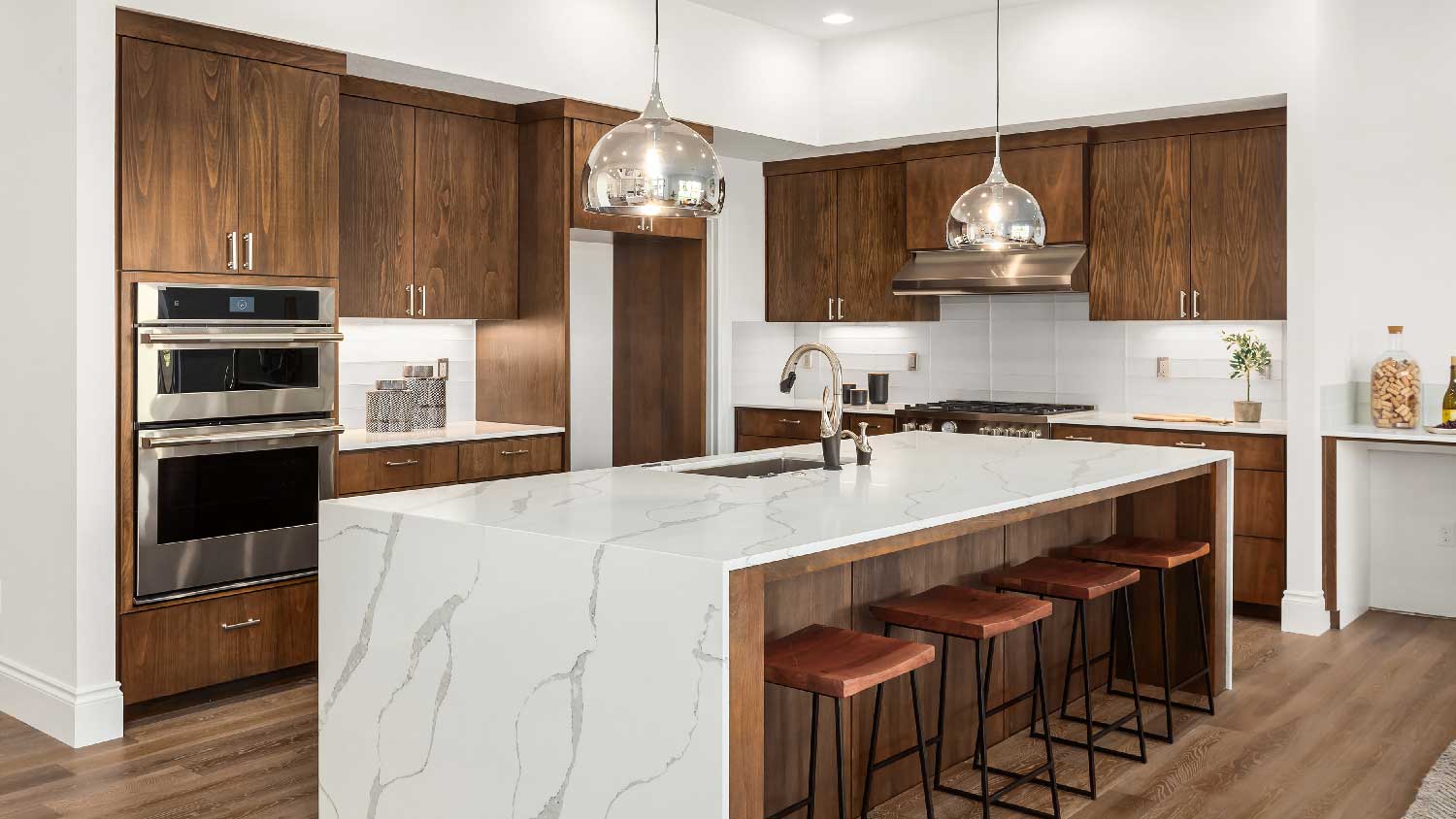
Quartz is an engineered stone that combines crushed quartz minerals with resins and pigments to create various designs and colors.
| Pros | Cons |
|---|---|
| Moisture-resistant | Susceptible to heat damage |
| Scratch- and chip-resistant | Difficult to install |
| Low maintenance | Less natural appearance |
| Customizable |
Best for:
Low-maintenance homeowners
Amateur chefs whose kitchens see plenty of cooking
Busy families
Quartz is very customizable and comes in solid colors to marble-like designs. Because it contains resin, it’s nonporous, which means it’s moisture- and scratch-resistant and doesn’t require sealing to keep it in good shape. This makes it a low-maintenance material that will suit homeowners who don’t want to keep up with regular sealing.
Although quartz is very durable, it is susceptible to heat damage, which can be a disadvantage when using it as a kitchen countertop surface. Quartz is heavy and bulky, which makes it hard to install. And because it’s engineered, it doesn’t look as natural as a solid stone surface.
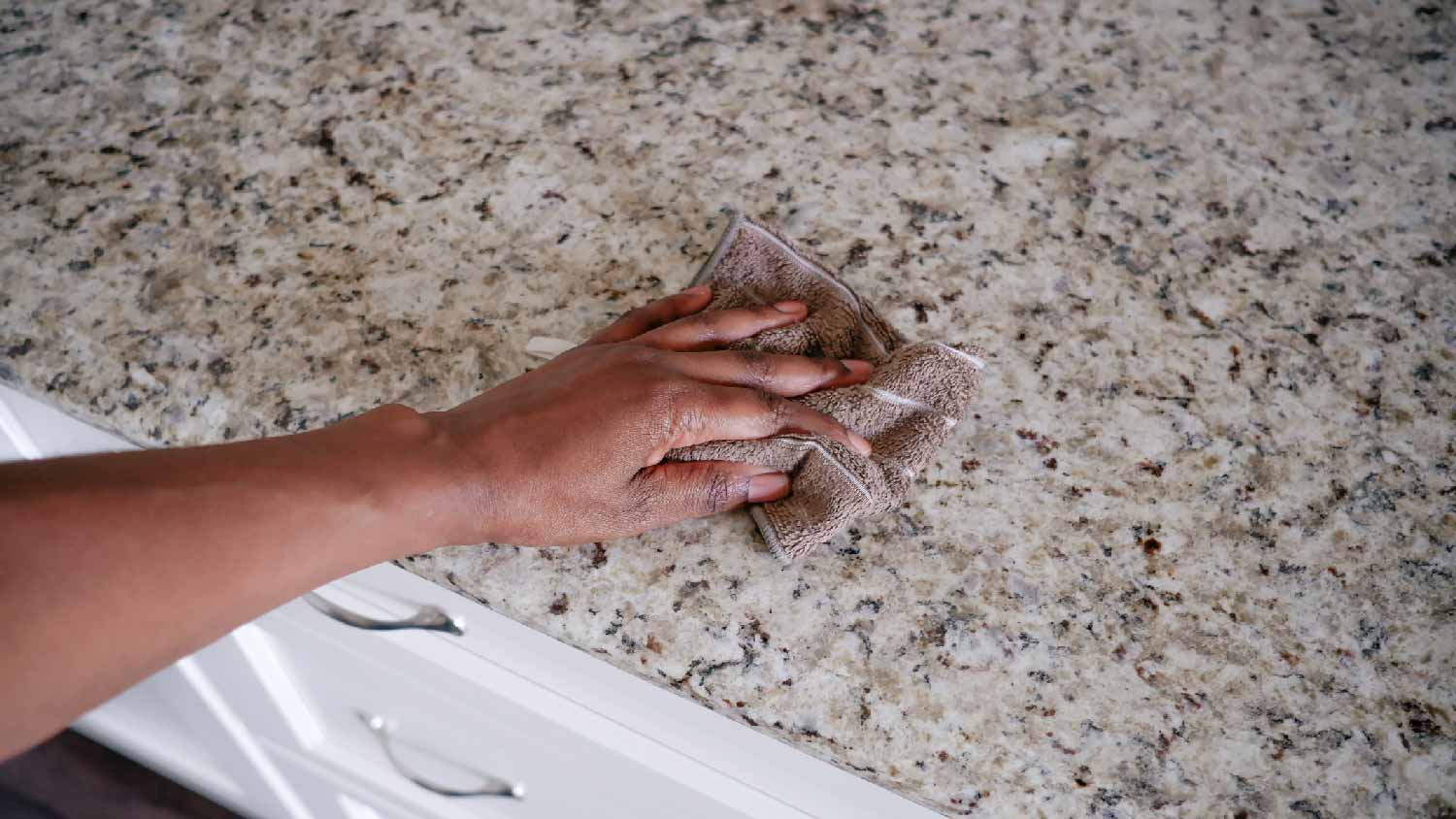
Quartzite is a metamorphic rock that’s naturally formed over time as the earth applies heat and pressure to sandstone.
| Pros | Cons |
|---|---|
| High durability | Porous |
| Heat-resistant | Requires regular sealing |
| Natural appearance | Difficult to install |
| Suitable for outdoor installation |
Best for:
Homeowners who prefer natural stone surfaces
Those looking for a heat-resistant countertop surface
Outdoor kitchens
Quartzite is a solid stone, which means it is very hard and durable. It’s especially good at resisting heat damage, so you don’t need to worry that an errant hot pan will leave a lasting mark. It also has a natural appearance that can resemble marble or sandstone—and the patterns in the stone are uniquely designed by Mother Nature herself.
Because quartzite is a natural stone, it’s porous and can be easily damaged by moisture. This means it requires regular sealing to prevent it from sustaining damage, which makes it more labor-intensive over time. Like quartz, quartzite is heavy and requires installation by a team of experienced professionals.
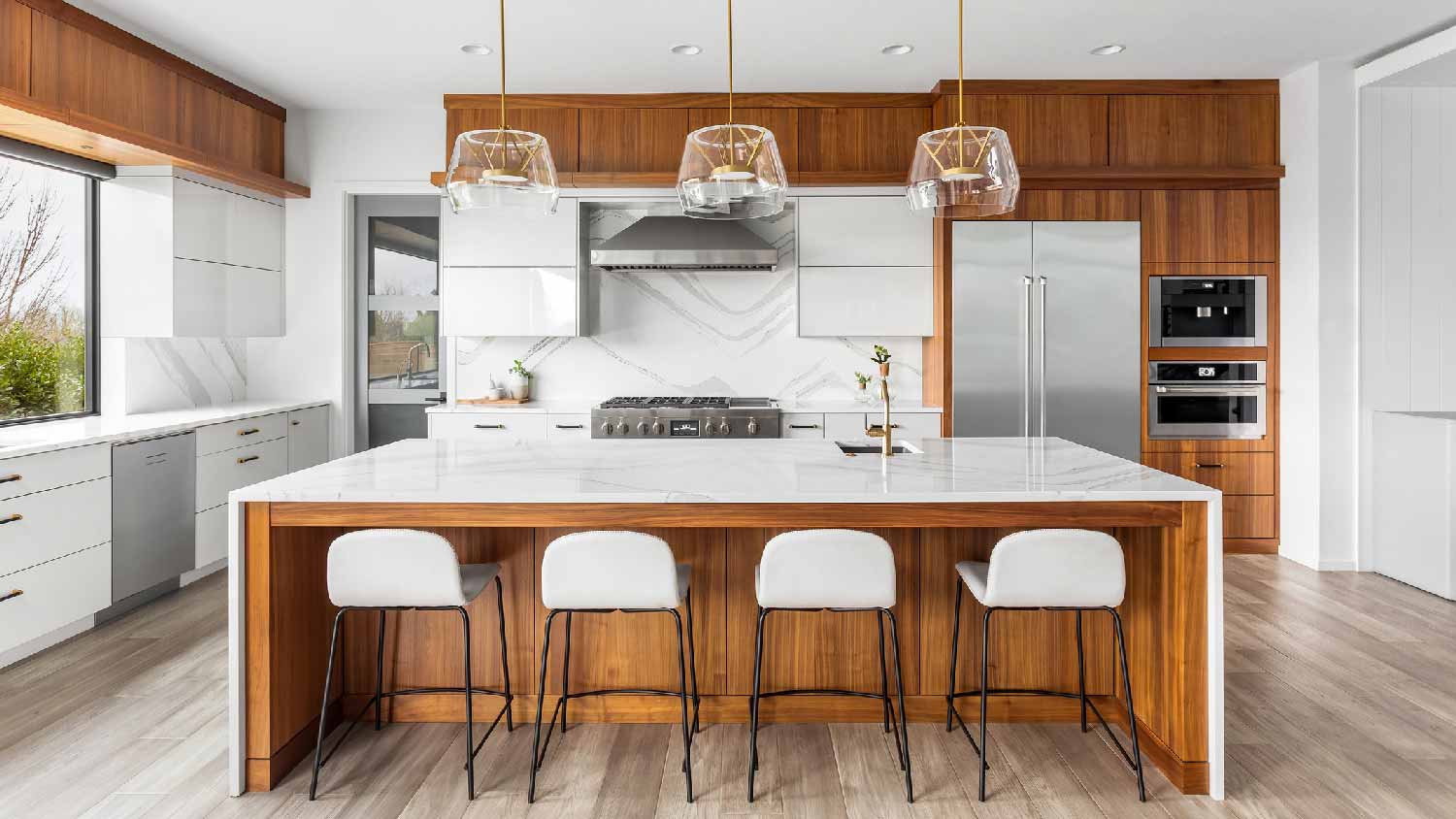
If you’re torn between natural stone and synthetic stone countertops, consider how quartz and quartzite compare in appearance, price, durability, maintenance, and more.
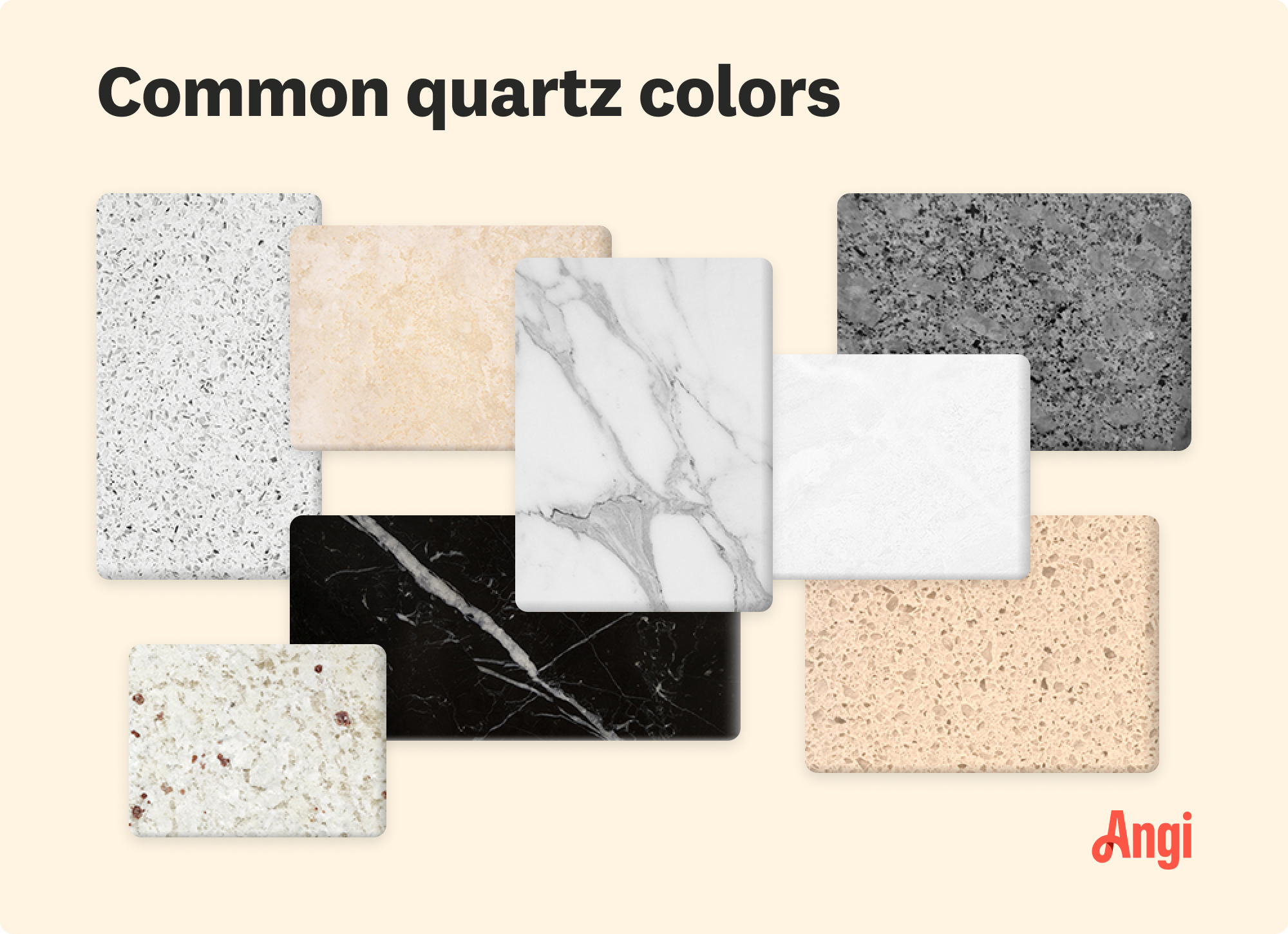
Both quartz and quartzite are attractive countertop materials that can enhance the aesthetics of your kitchen. As an engineered stone material, quartz comes in a wider variety of colors and patterns, making it easier to find an option to match your kitchen design. Quartzite is beautiful, but the color and design can vary significantly depending on the stone’s source, so you’ll need to buy in bulk to prevent mismatched surfaces in your kitchen.
Quartz and quartzite are durable materials that work well in a kitchen. However, quartz is more durable than quartzite. The resin component in quartz makes it nonporous, so it can easily resist moisture and staining. Quartzite requires regular sealing, though it’s naturally more heat-resistant than quartz.
Quartz and quartzite have similar price ranges, though quartzite is slightly more affordable. Quartzite countertops cost $2,000 to $5,200, with an average project price of $3,950. This material costs between $80 and $220 per square foot to install, though the exact cost depends on the type of quartzite, the desired finish, and the labor cost.
Quartz countertops cost an average of $4,500, though the cost can range from $1,500 to $8,000. Higher-grade quartz will cost more, and your color choice can affect your overall price. Generally, quartz countertops cost between $50 and $200 per square foot.
Both countertop materials are notoriously difficult to install due to their bulk and weight. Quartz is more durable than quartzite and less likely to break during installation, but installation is still best left to a local stone countertop pro simply due to its weight.
Professionals can often repair minor damage to a quartzite countertop by applying epoxy to the affected area. Quartz is a little trickier to fix; it can also be repaired with epoxy, but the substance may not stick to quartz as well as it sticks to quartzite. It can also be more challenging to match the epoxy color to a quartz countertop than to a quartzite one, so the repair may be more evident in quartz.
Both quartz and quartzite are easy-to-clean countertop surfaces that hold up to everyday kitchen use. However, because quartzite is a porous natural stone material, regular sealing is required to protect it from damage. Quartz doesn’t need to be sealed because the resin in the countertop means it’s not porous like quartzite.
Quartz and quartzite are both long-lasting countertop materials. However, well-maintained quartzite can last as long as 100 years, while quartz’s lifespan ranges from 20 to 60 years. Whichever you choose, it will last for decades—but as a natural material, quartzite has a slight edge over quartz regarding longevity.
Although quartzite is natural and quartz is engineered, the latter is the more sustainable choice. Quartzite requires a great deal of energy to be removed from the earth and shipped to its destination. Quartz, on the other hand, is often made with nontoxic chemicals, and its manufacturing uses less energy than it takes to extract quartzite.
From average costs to expert advice, get all the answers you need to get your job done.

Marble backsplashes are beautiful and costly additions to your kitchen. Our guide lays out marble options and the labor required to install it.

The cost of porcelain countertops is affected by many factors, primarily the material's type (tile or slab) and finish, as well as your counter’s size and shape.
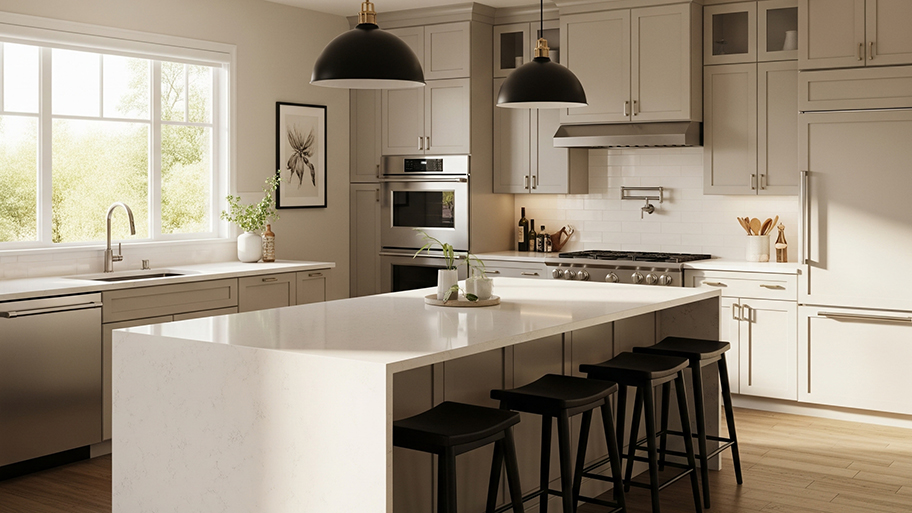
New quartz countertops can give any kitchen a facelift. Find out quartz countertop costs, including quartz slab prices and the cost of installation.

Stone countertops are a big investment, so make sure you hire the right contractor to cut them. Here are tips on choosing the right on-site granite cutter.

Which material is better for your kitchen: quartz vs. granite countertops? This guide breaks down the pros and cons of each to inform your decision.

If you are investing in new kitchen counters, you may wonder if quartz countertops are heat resistant. This guide explains how much heat quartz countertops can take and how to protect them.